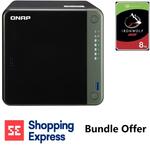This NAS and 8TB HDD bundle is on sale again and cheaper than last time. This QNAP has a perpetual QVR Pro license so you can have up to 8 camera channels recording to the NAS.
The NAS features 4 drive bays, Intel Celeron J4125 CPU, 4GB SODIMM DRR4 RAM (Upgradeable), dual 2.5 GBe ethernet, HDMI 2.0 output, PCIe Gen 2 x2, 2x USB 3.0 and 3x USB 2.0.
1% surcharge for select payment methods.


which is a better NAS? Synology or Qnap?
how does this compare with Synology DS920+?